Startups
Auto Added by WPeMatico
Auto Added by WPeMatico
Technology has been used to manage regulatory risk since the advent of the ledger book (or the Bloomberg terminal, depending on your reference point). However, the cost-consciousness internalized by banks during the 2008 financial crisis combined with more robust methods of analyzing large datasets has spurred innovation and increased efficiency by automating tasks that previously required manual reviews and other labor-intensive efforts.
So even if RegTech wasn’t born during the financial crisis, it was probably old enough to drive a car by 2008. The intervening 11 years have seen RegTech’s scope and influence grow.
RegTech startups targeting financial services, or FinServ for short, require very different growth strategies — even compared to other enterprise software companies. From a practical perspective, everything from the security requirements influencing software architecture and development to the sales process are substantially different for FinServ RegTechs.
The most successful RegTechs are those that draw on expertise from security-minded engineers, FinServ-savvy sales staff as well as legal and compliance professionals from the industry. FinServ RegTechs have emerged in a number of areas due to the increasing directives emanating from financial regulators.
This new crop of startups performs sophisticated background checks and transaction monitoring for anti-money laundering purposes pursuant to the Bank Secrecy Act, the Office of Foreign Asset Control (OFAC) and FINRA rules; tracks supervision requirements and retention for electronic communications under FINRA, SEC, and CFTC regulations; as well as monitors information security and privacy laws from the EU, SEC, and several US state regulators such as the New York Department of Financial Services (“NYDFS”).
In this article, we’ll examine RegTech startups in these three fields to determine how solutions have been structured to meet regulatory demand as well as some of the operational and regulatory challenges they face.
Powered by WPeMatico
Hello and welcome back to Startups Weekly, a weekend newsletter that dives into the week’s noteworthy startups & venture capital news. Before I jump into today’s topic, let’s catch up a bit. Last week, I struggled to understand WeWork’s growth trajectory. Before that, I noted some thoughts on scooter companies’ struggle to raise new cash.
Remember, you can send me tips, suggestions and feedback to kate.clark@techcrunch.com or on Twitter @KateClarkTweets. If you don’t subscribe to Startups Weekly yet, you can do that here.
What’s on my mind this week? Data. Now that it’s July, I figured it was time for a VC investment data check-in. How much have VCs invested so far this year? Are they finally investing more in female founders? I’ve got answers. (Data source: PitchBook)

Pod Foods gets VC backing to reinvent grocery distribution
DotLab gets $10M to bring endometriosis test to market
Waresix hauls in $14.5M to digitize logistics in Indonesia
Calm gets $27M for its meditation app
Mobi nabs $50M for its new broadcast service
There were so many deep dives this week on TechCrunch ranging from Jony Ive’s influence on Apple written by TechCrunch editor-in-chief Matthew Panzarino, a look at the intense backlash on Superhuman and whether its justified, plus my own look at Fin’s pivot to enterprise analytics platform. Here are the ones I recommend clicking:
Higher Ground Labs is betting tech can help sway the 2020 elections by Jon Shieber
Superbacklash by Matthew Panzarino
From Seed to Series A: Scaling a startup in Latin America by Nathan Lustig
Andrew Kortina and Sam Lessin on Fin’s workplace pivot by Kate Clark
Apple sans Ive by Matthew Panzarino
E.ventures, an early-stage global fund, brought in a fresh $400 million this week, Sony announced a new $185 million fund and…
Filing scoop: @lancearmstrong‘s Next Ventures plans to raise $75M for its debut fund to invest in sports, fitness, nutrition and wellness startups: https://t.co/gREk0iUuAX
— Kate Clark (@KateClarkTweets) July 5, 2019
When is the right time to pitch VCs for funding?
A compelling pitch deck that quickly and clearly presents your startup as an exceptional investment opportunity is a clear edge when raising a round. But could fundraising be more effective if you knew when to send your pitch deck – the times of year when it’s more likely to be reviewed and when it’s likely to be viewed more often? If we all had a magical algorithm that could predict exactly which investors would review your deck and when, we’d be fundraising geniuses — closing our round faster and with far less effort. No such algorithm exists (at least not yet), but I can share some useful data that offers insights into some of these seasonal fundraising trends, with a few that seem to defy conventional wisdom…
Extra Crunch readers can read the rest of Russ Heddleston’s story here. If you’ve been unsure whether to sign up for TechCrunch’s awesome new subscription service, now is the time.
If you enjoy this newsletter, be sure to check out TechCrunch’s venture-focused podcast, Equity. In this week’s episode, available here, I interview Revolution’s Clara Sieg. We discuss the Rise of the Rest and investing in underrepresented geographies.
Extra Crunch subscribers can read a transcript of each week’s episode every Saturday. Read last week’s episode here and learn more about Extra Crunch here. Equity drops every Friday at 6:00 am PT, so subscribe to us on Apple Podcasts, Overcast, Pocket Casts, Downcast and all the casts.
Powered by WPeMatico
Away from the limelight of the press and the frenzy of fundraising, a tech startup in India has achieved a feat that few of its peers have managed: going public.
IndiaMART, the country’s largest online platform for selling products directly to businesses, raised nearly $70 million in a rare tech IPO for India this week.
The milestone for the 23-year-old firm is so uncommon for India’s otherwise burgeoning startup ecosystem that, beyond being over-subscribed 36 times, pent up demand for IndiaMART’s stock saw its share price pop 40% on its first day of trading on National Stock Exchange on Thursday — a momentum that it sustained on Friday.
The stock ended Friday at Rs 1326 ($19.3), compared to its issue price of Rs 973 ($14.2).
IndiaMART is the first business-to-business e-commerce firm to go public in India. Its IPO also marks the first listing for a firm following the May reelection of Narendra Modi as the nation’s Prime Minister and the months-long drought that led to it.
Accounting firm EY said it expects more companies from India to follow suit and file for IPO in the coming months.
“Now that national elections are over and favorable results secured, IPO activity is expected to gain momentum in H2 2019 (second half of the year). Companies that had filed their offer documents with the Indian stock markets regulator during H2 2018 and Q1 2019 may finally come to market in the months ahead,” it said in a statement (PDF).
The fireworks of the IPO are just as impressive as IndiaMART’s journey.
The startup was founded in 1996 and for the first 13 years, it focused on exports to customers abroad, but it has since modernized its business following the wave of the internet.
“The thesis was, in 1996, there were no computers or internet in India. The information about India’s market to the West was very limited,” Dinesh Agarwal, co-founder and CEO of IndiaMART, told TechCrunch in an interview.
Until 2008, IndiaMART was fully bootstrapped and profitable with $10 million in revenue, Agarwal said. But things started to dramatically change in that year.
“The Indian rupee became very strong against the dollar, which dwindled the exports business. This is also when the stock market was collapsing in the West, which further hurt the exports demand,” he explained.
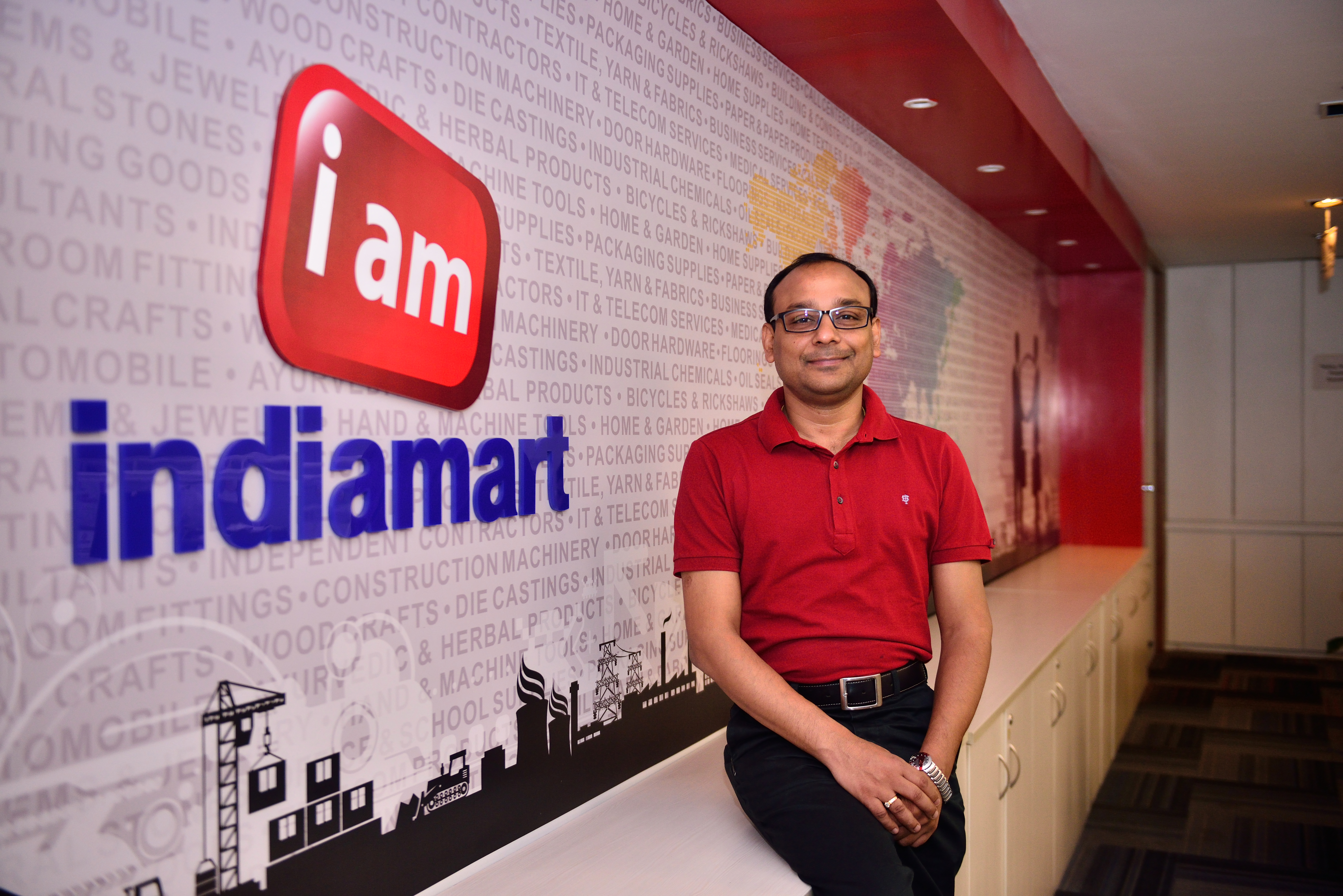
Dinesh Agarwal, founder and CEO of IndiaMart.com, poses for a profile shot on July 29, 2015 in Noida, India.
By this time, millions of people in India were on the internet and, with tens of millions of people owning a feature phone, the conditions of the market had begun to shift towards digital.
“This is when we decided to pursue a completely different path. We started to focus on the domestic market,” Agarwal said.
Over the last 10 years, IndiaMART has become the largest e-commerce platform for businesses with about 60% market share, according to research firm KPMG. It handles 97,000 product categories — ranging from machine parts, medical equipment and textile products to cranes — and has amassed 83 million buyers and 5.5 million suppliers from thousands of towns and cities of India.
According to the most recent data published by the Indian government, there are about 50 to 60 million small and medium-sized businesses in India, but only around 10 million of them have any presence on the web. Some 97% of the top 50 companies listed on National Stock Exchange use IndiaMART’s services, Agarwal said.
That’s not to say that the transition to the current day was a straightforward process for the company. IndiaMART tried to capitalize on its early mover advantage with a stream of new services which ultimately didn’t reap the desired rewards.
In 2002, it launched a travel portal for businesses. A year later, it launched a business verification service. It also unveiled a payments platform called ABCPayments. None of these services worked and the firm quickly moved on.
Part of IndiaMART’s success story is its firm leadership and how cautiously it has raised and spent its money, Rajesh Sawhney, a serial angel investor who sits on IndiaMART’s board, told TechCrunch in an interview.
IndiaMART, which employs about 4,000 people, is operationally profitable as of the financial year that ended in March this year. It clocked some $82 million in revenue in the year. It has raised about $32 million to date from Intel Capital, Amadeus Capital Partners and Quona Capital. (Notably, Agarwal said that he rejected offers from VCs for a very long time.)
The firm makes most of its revenue from subscriptions it sells to sellers. A subscription gives a seller a range of benefits including getting featured on storefronts.
4/4. So many Indian small businesses have so much to thank @DineshAgarwal for. And after the iconic IPO, so many Indian entreprenuers will have so much to thank him for – forever unlocking the Indian public markets to current & future generation of Indian internet companies
— Kunal Bahl (@1kunalbahl) July 4, 2019
There are only a handful of internet companies in India that have gone public in the last decade. Online travel service MakeMyTrip went public in 2010. Software firm Intellect Design Arena and e-commerce store Koovs listed in 2014, then travel portal Yatra and e-commerce firm Infibeam followed two years later.
India has consistently attracted billions of dollars in funding in recent years and produced many unicorns. Those include Flipkart, which was acquired by Walmart last year for $16 billion, Paytm, which has raised more than $2 billion to date, Swiggy, which has bagged $1.5 billion to date, Zomato, which has raised $750 million, and relatively new entrant Byju’s — but few of them are nearing profitability and most likely do not see an IPO in their immediate future.
In that context, IndiaMART may set a benchmark for others to follow.
“The fact that we have a homegrown digital commerce business, serving both the urban and smaller cities, and having struggled and been around for so long building a very difficult business and finally going public in the local exchange is a phenomenal story,” Ganesh Rengaswamy, a partner at Quona Capital, told TechCrunch in an interview. “It keeps the story of India tech, to the Western world, going.”
Congratulations @DineshAgarwal for an iconic IPO! @IndiaMART has set an example and hope for all Indian Internet companies looking to go public. Cheers! https://t.co/yJumFjfitS
— Vani Kola (@VaniKola) July 4, 2019
Generally, it is agreed that there are too few IPOs in India and the industry can benefit from momentum and encouragement of high profile and successful public listings.
“There is a firm consensus that in India, markets will prefer only the IPOs of companies that are profitable. And investors in India might not value those companies. Both of these issues are being addressed by IndiaMART,” said Sawhney.
“We need 30 to 40 more IPOs. This will also mean that the stock market here has matured and understands the tech stocks and how it is different from other consumer stocks they usually handle. More tech companies going public would also pave the way for many to explore stock exchanges outside of India.
“Indian market is ready for more tech stocks. We just need to get more companies to go out there,” Sawhney added, although he did predict that it will take a few years before the vast majority of leading startups are ready for the public market.
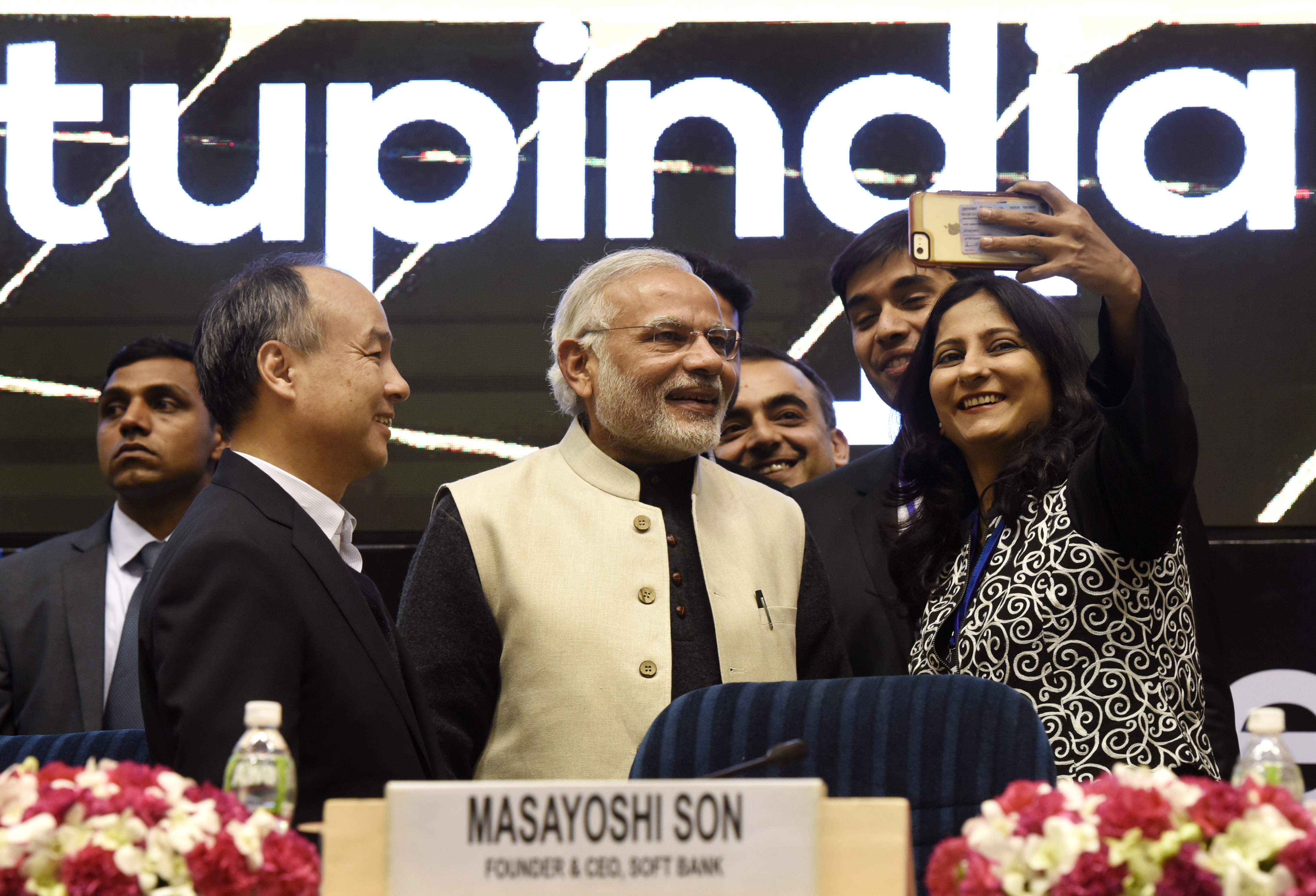
The Indian government, for its part, this week announced a number of incentives to uplift the “entrepreneurial spirit” in the nation.
Finance minister Nirmala Sitharaman said the government would ease foreign direct investment rules for certain sectors — including e-commerce, food delivery, grocery — and improve the digital payments ecosystem. Sitharaman, who is the first woman to hold this position in India, said the government would also launch a TV program to help startups connect with venture capitalists.
IndiaMART has managed to build a sticky business that compels more than 55% of its customers to come back to the platform and make another transaction within 90 days, Agarwal — its CEO — said. With some 3,500 of its 4,000 employees classified as sales executives, the company is aggressive in its pursuit of new customers. Moving forward, that will remain one of its biggest focuses, according to Agarwal.
“Most of our time still goes into educating MSMEs on how to use the internet. That was a challenge 20 years ago and it remains a challenge today,” he told TechCrunch.
In recent years, IndiaMART has begun to expand its suite of offerings to its business customers in a bid to increase the value they get from its platform and thus increase their reliance on its service.
IndiaMART has built a customer relationship management (CRM) tool so that customers need not rely on spreadsheets or other third-party services.
“We will continue to explore more SaaS offerings and look into solving problems in accounting, invoice management and other areas,” said Agarwal.
The firm also recently started to offer payment facilitation between buyers and sellers through a PayPal -like escrow system.
“This will bridge the trust gap between the entities and improve an MSME’s ability to accept all kinds of payment options including the new age offerings.”
There’s an elephant in the room, however.
A bigger challenge that looms for IndiaMART is the growing interest of Amazon and Walmart in the business-to-business space. Several startups including Udaan — which has raised north of $280 million from DST Global and Lightspeed Venture Partners — have risen up in recent years and are increasingly expanding their operations. Agarwal did not seem much worried, however, telling TechCrunch that he believes that his prime competition is more focused on B2C and serving niche audiences. Besides he has $100 million in the bank himself.
Indeed, as Quona Capital’s Rengaswamy astutely noted, competition is not new for IndiaMART — the company has survived and thrived more than two decades of it.
“Alibaba came and gave up,” he noted.
An important — and unanswered question — that follows the successful IPO is how IndiaMART’s stock will fare over the coming months. A glance to the U.S. — where hyped companies like Uber, Lyft and others have seen prices taper off — shows clearly that early demand and sustained stock performance are not one and the same.
Nobody knows at this point, and the added complexity at play is that the concept of a tech IPO is so uncommon in India that there is no definitive answer to it… yet. But IndiaMART’s biggest achievement may be that it sets the pathway that many others will follow.
Powered by WPeMatico
The Daily Crunch is TechCrunch’s roundup of our biggest and most important stories. If you’d like to get this delivered to your inbox every day at around 9am Pacific, you can subscribe here.
1. HQ Trivia lays off ~20% as it preps subscriptions
The cuts hit HQ’s HR, marketing and product engineering teams, according to LinkedIn profiles of employees let go. The cuts could further hamper morale at the startup following a tough first half of the year.
It also could leave the company short-handed as it attempts to diversify revenue with the upcoming launch of monthly subscriptions.
2. Tesla shows off next-gen automated emergency braking stopping for pedestrians and cyclists
The upcoming features include automatically engaging the brakes on a vehicle when the system detects a pedestrian crossing the car’s path, and doing the same for a cyclist.
3. Internet group brands Mozilla ‘internet villain’ for supporting DNS privacy feature
The trade group for U.K. internet service providers nominated Mozilla for the title because of a proposed security feature that ISPs say will allow users to “bypass U.K. filtering obligations and parental controls, undermining internet safety standards in the U.K.”

4. Apple reportedly shifting to new keyboard design in 2019/2020 MacBooks
Apple is set to replace the technology underlying the keyboards found in its MacBook Air and MacBook Pro computers, according to a new report from Apple analyst Ming-Chi Kuo.
5. Sony’s new wireless earbuds pack great noise-canceling and battery life
Brian Heater has only had a limited time with Sony’s WF-1000XM3, but he says they seem custom-built for long flights.
6. Waresix hauls in $14.5M to advance its push to digitize logistics in Indonesia
Like others in its industry — which include Chinese unicorn Manbang and BlackBuck in India — Waresix is focused on optimizing logistics by making the process more transparent for clients and more efficient for haulage companies and truckers.
7. What everyone at a startup needs to know about immigration
Over the past three years, immigration policies and procedures have been in a state of flux and the process has become more unforgiving for even the smallest mistakes. (Extra Crunch membership required.)
Powered by WPeMatico
French startup Karamel wants to help you find things to do for your kids. The company is launching a mobile app that lets you find and book kid-friendly activities around you.
The startup also just raised a $560,000 round (€500,000) from Kima Ventures, Roxanne Varza, Thibaud Elzière and Oleg Tscheltzoff. Varza participates in the Atomico Angel Programme, which means that Atomico handed out $100,000 to invest in multiple early-stage companies. Atomico and Varza both see returns if the company eventually succeeds.
Karamel wants to become a one-stop shop for things your kids can do. When you open the app, you get a curated selection of activities around you so that you can find something to do this weekend, for instance.
If you’re looking for something specific, you can search for activities based on multiple criteria, such as the age of your child, an activity category, price, distance and day of the week.
You also can find recurring activities in case your child really wants to learn a new instrument or start a new sport, for instance.
On the other side of the marketplace, there are many different organizations in charge of activities. It’s a fragmented market, and those organizations don’t always know how to reach parents efficiently.
Thanks to Karamel, those organizations should get more traffic and could focus more on activities themselves. The startup doesn’t charge any monthly subscription fee. Instead, Karamel is taking a cut on transactions. Parents pay the same price if they book directly or though Karamel.
The service is currently live in Paris. And if you live in Marseille, Lyon, Bordeaux or Montpellier, you can search for activities but can’t book through the app just yet.
In the U.S., KidPass provides something vaguely similar, but with a monthly subscription fee. KidPass opted for a credit-based system like Audible or ClassPass.
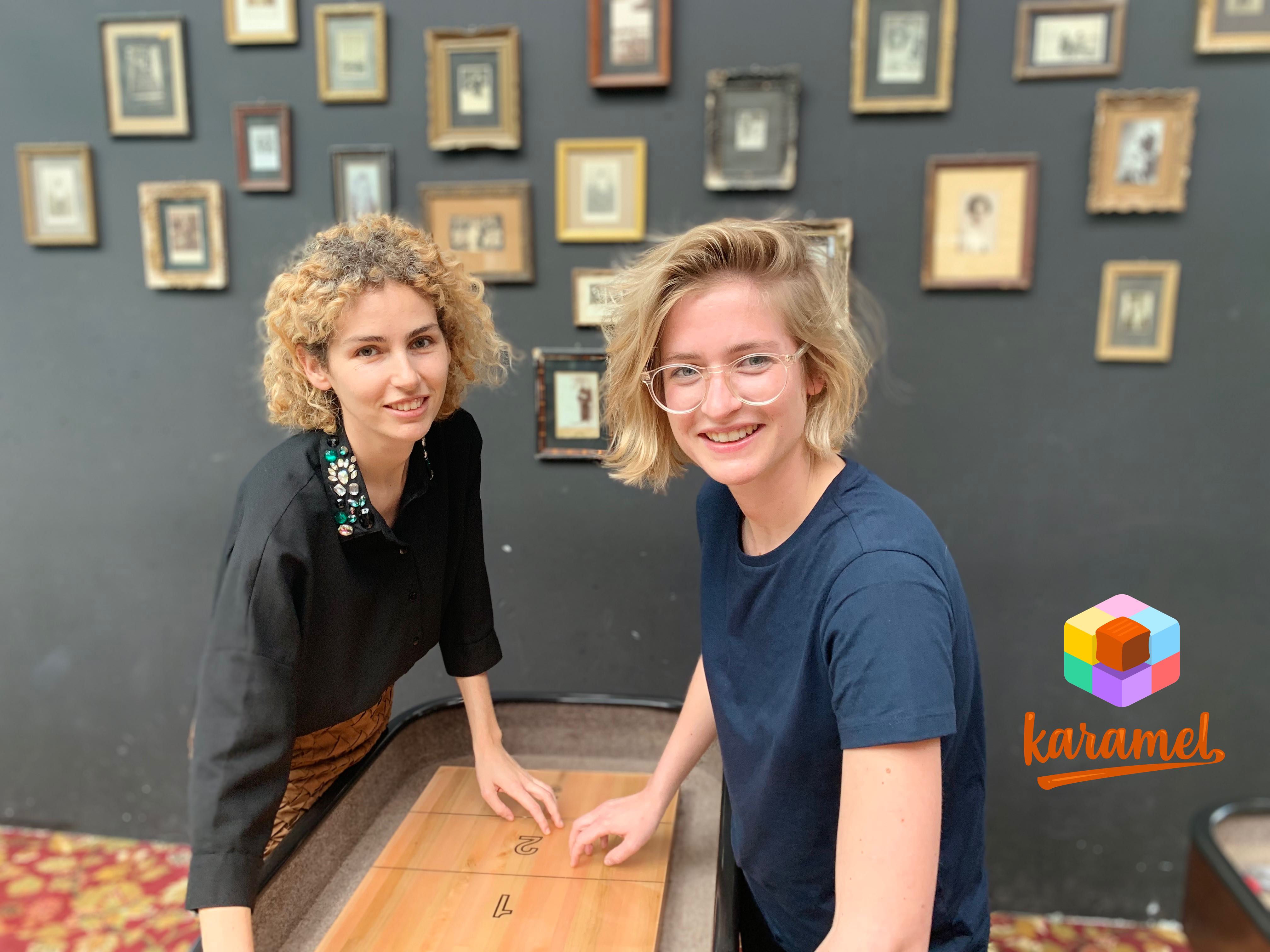
Powered by WPeMatico
Hello and welcome back to Equity, TechCrunch’s venture capital-focused podcast, where we unpack the numbers behind the headlines.
I was in the studio alone this week with the wonderful Clara Sieg of Revolution, an early-stage venture capital fund that invests in disruptive startups from underrepresented geographies. As you might have guessed, we talked about the rising trend of investors backing companies from “second-tier” markets like Austin, Atlanta, Denver, Philadelphia, Seattle, etc.
Clara herself hails from Pittsburgh, an up and coming market for technology startups and venture capital investments. We discussed how that has influenced her career in VC and how she landed at Revolution (she’s been there for nearly a decade!) in the first place.
In this special episode, Clara also teaches me how cities become tech hubs. It’s a special kind of recipe. A city must have a great university, or a few, nearby to provide a constant flow of talent. They need some big corporations around for the same reason. They need a healthy community of angel investors ready and willing to get things going. And… well, listen to the episode to learn the rest.
Finally, I ask Clara what investment she regrets not making the most. Her answer might surprise you.
Extra Crunch subscribers can read a transcript of each week’s episode every Saturday. Read last week’s episode here and learn more about Extra Crunch here.
Equity drops every Friday at 6:00 am PT, so subscribe to us on Apple Podcasts, Overcast, Pocket Casts, Downcast and all the casts.
Powered by WPeMatico
French startup Clever Cloud is a cloud-hosting company that operates a Platform-as-a-Service (or PaaS). The company just launched GPU-based instances for machine learning purposes under a new brand, Clever Grid.
Behind the scene, the company uses Nvidia GeForce GTX 1070. You get billed by the minute and the most basic instance costs €0.42 per hour, €10 per day or €300 per month. For this price, you get 6GB of RAM, an 8-core CPU, a one GPU and 250GB of storage.
Of course, you can pay more to access beefier machines. If you max out your GPU instance, you get 60GB of RAM, 32 CPU cores and 4 GPUs on the same instance. It can cost as much as €1,200.
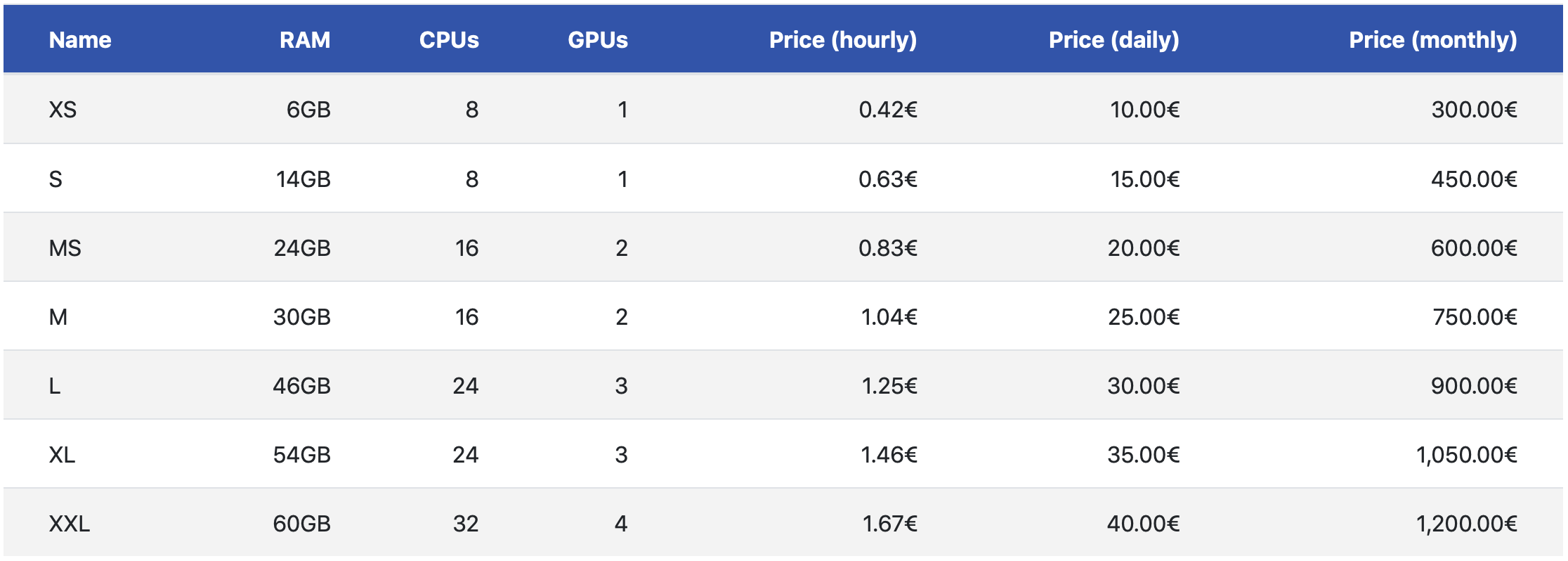
If you’re a data scientist and don’t know much about cloud infrastructure, Clever Cloud tries to abstract infrastructure management as much as possible. You can run your Python code directly on your cloud instance using a web interface.
Those instances also support TensorFlow, Scikit-learn, CUDA, Keras and PyTorch. You also can run Docker containers on those GPU instances.
One of the advantages of Clever Cloud is that it integrates directly with a GitHub repository. You can connect to your GitHub account and start a cloud instance based on a repository. The company then deploys and runs your code on a server.
In addition to seamless deployments, Clever Cloud has additional features to make sure your service runs smoothly, such as monitoring, backups and security updates.
Clever Cloud clients include Airbus, MAIF, Compte Nickel, Sogeti and the South African Ministry of Health.
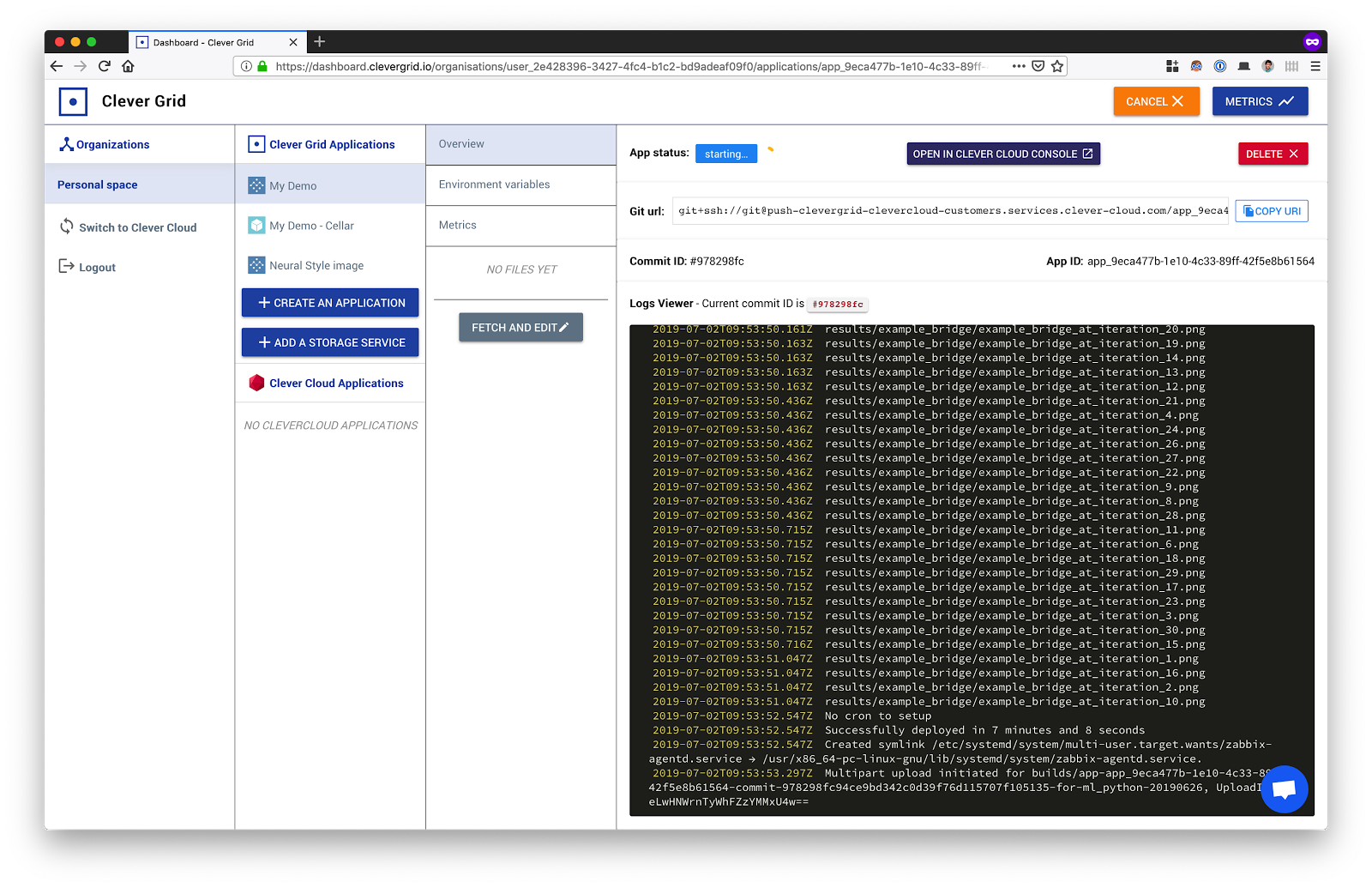
Powered by WPeMatico
Founded in 2011, Gogoro now makes the best-selling electric scooters in Taiwan, where it is headquartered. The startup has always seen itself as an end-to-end platform developer, however, and today it marked a major milestone with the announcement of a new vehicle sharing system. Called GoShare, the program will start operating with a pilot fleet of about 1,000 Gogoro smart scooters next month in Taoyuan City, Taiwan, before becoming available as a turnkey solution for partners.
Gogoro, which develops everything from their scooters and batteries to software, telematics control units and back-end servers, describes GoShare as “first fully integrated mobility sharing platform and solution.” Co-founder and CEO Horace Luke tells TechCrunch that Gogoro wants to work with partners to expand GoShare into international markets in Europe, Australia and Asia next year. He adds that building the entire platform, including its unique swappable battery system, gives Gogoro an advantage over vehicle-sharing programs from companies like Uber, Lyft, Lime, Bird and Coup because it can constantly track vehicle performance, fine-tune the system and incorporate feedback into new designs.
One of Gogoro scooters’ main advantages is their batteries, which are about the size of shoeboxes and slide in and out of scooters and charging kiosks. In Taiwan, batteries can be swapped at kiosks found at gas stations and more offbeat locations, including retail stores and cafes. GoShare scooters can use the same kiosks as privately owned Gogoro vehicles. This means that users can keep riding the same vehicle all day, swapping batteries whenever necessary (on average, Gogoro scooters can travel about 80 km on one charge). Once they are done using them, they can leave them wherever it is legal to park scooters.
“We’re a platform, we create hardware, software and server technology to serve the transportation of the future and if we can make cities cleaner and healthier, we will do it anyway possible, whether through ownership and charging batteries at home or buying scooters and swapping batteries in the system we provide or, in this case, not even buying a vehicle, but sharing it,” says Luke.
To sign up, users download an iOS or Android app and upload a photo of their driver’s license. Gogoro then uses AI-based face scanning software to check if they match the license’s photo before asking for payment information. Once enrolled, drivers can use the app to locate and reserve scooters. GoShare’s pricing has not been announced yet, but Luke says it will be competitive with public transportation. Gogoro is working with Taoyuan City’s government to offer incentives like free parking in an effort to reduce pollution and traffic.
In a press statement, Taoyuan City Mayor Wen-Tsan Cheng said, “We are confident this Gogoro partnership will continue producing remarkable reductions in air pollution caused by vehicle emissions and will accelerate the transformation of Taoyuan into a smart, livable city.”
With other vehicle-sharing systems, “it has always been the dream to have the vehicles be free-floating and autonomous in management. But they are not autonomous,” says Luke. “Most are used once or twice a day because they run out of power, or the battery is low and people are worried about them running out of energy. That is where Gogoro comes in, because we have a network that enables people to ride vehicles for as long as they want.”
There are currently about 1,200 charging kiosks in Taiwan, with about 200 in Taoyuan City, delivering power to about 200,000 scooters. Eight years after it launched, Luke says Gogoro now holds a 97% share of electric scooters sold each month in the country. When counted as part of the larger vehicle market in Taiwan, including gas vehicles, Gogoro now holds a 17% share.
Luke says the company sees Taiwan, where scooters are very popular but also a major contributor to air pollution, as Gogoro’s pilot market. It recently launched the Gogoro 3, and announced partnerships with Yamaha, Aeon and PGO to develop scooters that will run on its batteries.
The ultimate goal of Gogoro’s end-to-end system is to package it as a turnkey solution for partners around the world, says Luke. “You don’t need to shop around anymore. You can come to us with your vehicle-sharing program and say you want to turn it on.”
Powered by WPeMatico
Waresix, one of a handful of startups aiming to modernize logistics in Indonesia — the world’s fourth most populous country — has pulled in $14.5 million to grow its 18-month-old business.
This new investment, Waresix’s Series A, is led by EV Growth — the growth-stage fund co-run by East Ventures — with participation from SMDV — the investment arm of Indonesia corporation Sinar Mas — and Singapore’s Jungle Ventures . The startup previously raised $1.6 million last year from East Ventures, SMDV and Monk’s Hill Ventures. It closed a seed round in early 2018.
Waresix is aiming to digitize logistics, the business of moving goods from A to B, which it believes is worth a total of $240 billion in Indonesia.
A large part of that is down to the country’s geography. The archipelago officially has more than 17,000 islands, but there are five main ones. That necessitates a lot of challenges for logistics, which are said to account for 25-30% of GDP — a figure that is typically below 5% in Western markets — while Indonesia barely scraped the top 50 rankings in World Bank’s Logistics Performance Index.
But, as Southeast Asia’s largest economy and the key market for digital growth in the region, that makes this an attractive problem to solve… or, rather, attractive industry to modernize.
Like others in its space worldwide — which include Chinese unicorn Manbang and BlackBuck in India — Waresix is focused on optimizing logistics by making the process more transparent for clients and more efficient for haulage companies and truckers. That includes removing the chain of “middle man” brokers, who add costs and reduce transparency, and provide a one-stop solution for transportation by land or sea, as well as cold storage and general cargo handling.
As of today, Waresix claims a fleet of more than 20,000 trucks and over 200 warehouse partners across Indonesia. The company said it plans to use this new capital to expand that coverage further. In particular, that’ll include additional land transport options and additional warehouse capacity in tier-two cities and more remote areas. That’s a push that founders Andree Susanto (CEO) and Edwin Wibowo (CFO) — who met at UC Berkeley in the U.S. — believe fits with Indonesia’s own $400 billion commitment to improve national infrastructure and transport.
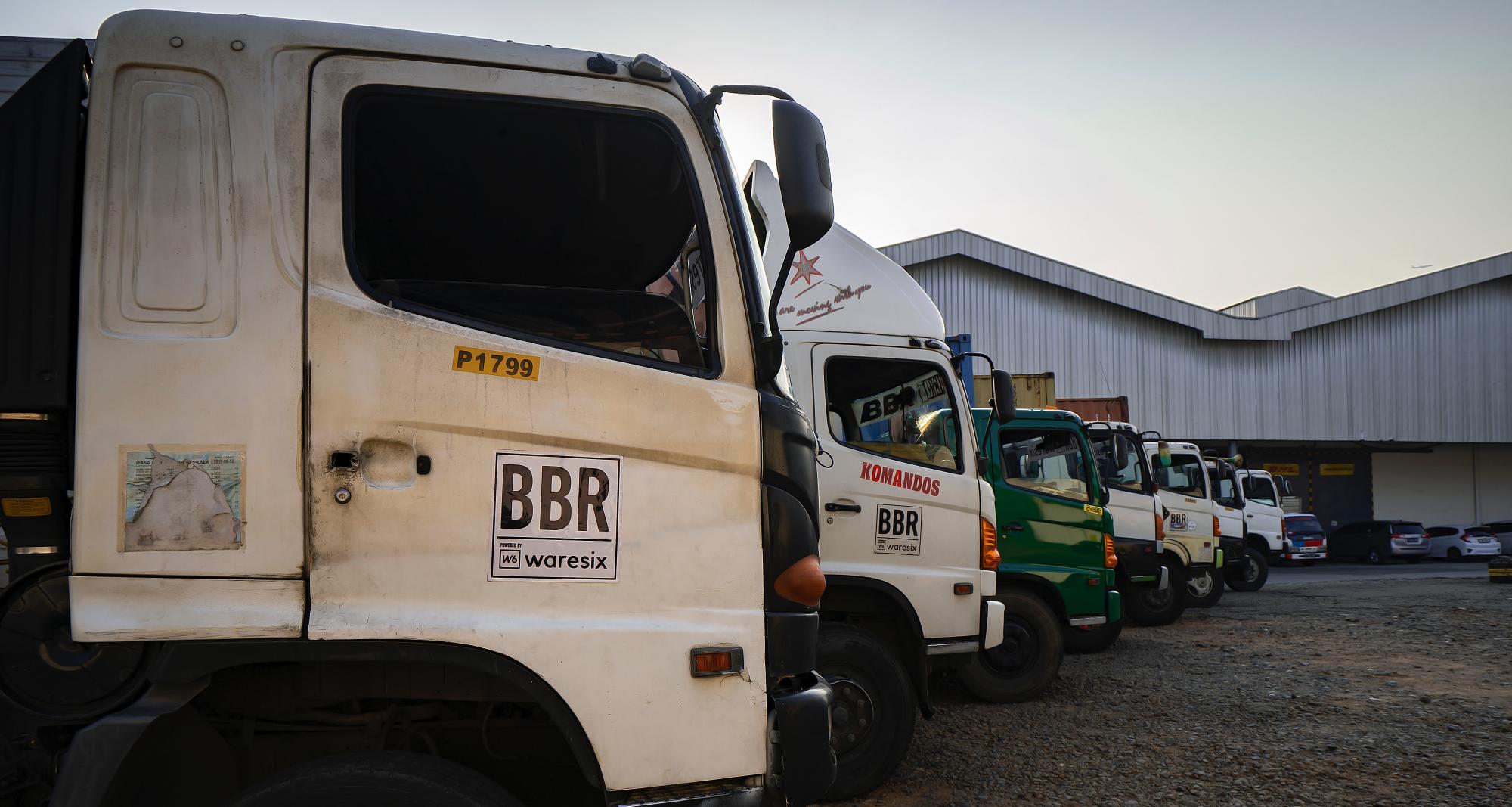
Waresix trucks
It is also consistent with East Ventures, the long-standing early-stage VC, which has backed a pack of young companies aiming to inject internet smarts into traditional industries in Indonesia. Some of that portfolio includes Warung Pintar, which develops smart street vendor kiosks, Kedai Sayur, which is digitizing street vendors, and Fore Coffee, which draws inspiration from China’s digital-first brand Luckin Coffee, which recently listed in the U.S.
Now with EV Growth, which reached a final close of $200 million thanks to LPs that include SoftBank, East Ventures has the firepower to write larger checks that go beyond seed and pre-Series A deals, as it has done with Waresix.
But the company is far from alone in going after the logistics opportunity in Indonesia. Its rivals include Kargo, which was started by a former Uber Asia exec and is backed by Uber co-founder Travis Kalanick’s 10100 fund among others, and Ritase.
Ritase, which claims to be profitable, closed an $8.5 million Series A this week. It said it has 7,500 trucks and, on the client side, some 500 SMEs and a smattering of well-known global brands. Kargo has kept its metrics quiet, but it is a later arrival on the scene. The startup only came out of stealth in March of this year when it announced a $7.6 million funding round.
Powered by WPeMatico
Alphabet-backed UnitedMasters, the music label distribution startup and record label alternative that offers artists 100 percent ownership of everything they create, launched its iPhone app today.
The iPhone app works like the service they used to offer only via the web, giving artists the chance to upload their own tracks (from iCloud, Dropbox or directly from text messages), then distribute them to a full range of streaming music platforms, including Spotify, Apple Music, Tidal and more. In exchange for this distribution, as well as analytics on how your music is performing, UnitedMasters takes a 10% share on revenue generated by tracks it distributes, but artists retain full ownership of the content they create.
UnitedMasters also works with brand partners, including Bose, the NBA and AT&T, to place tracks in marketing use across the brand’s properties and distributed content. Music creators are paid out via PayPal once they connect their accounts, and they can also tie-in their social accounts for connecting their overall online presence with their music.

Using the app, artists can create entire releases by uploading not only music tracks but also high-quality cover art, and by entering information like whether any producers participated in the music creation, and whether the tracks contain any explicit lyrics. You can also specific an exact desired release date, and UnitedMasters will do its best to distribute across services on that day, pending content approvals.
UnitedMasters was founded by former Interscope Records president Steve Stoute, and also has funding from Andreessen Horwitz and 20th Century Fox. It’s aiming to serve a new generation of artists who are disenfranchised by the traditional label model, but seeking distribution through the services where listeners actually spend their time, and using the iPhone as manage the entire process definitely fits with serving that customer base.
Powered by WPeMatico